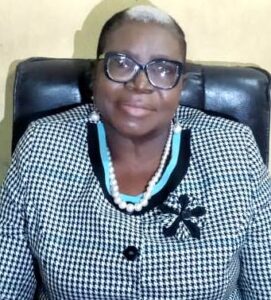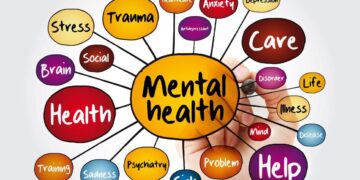“The new Minister knows his onions and his right from his left”
Mrs Violet Olaitan Williams is an active member of the Nigerian maritime industry. Recently, she was appointed into the board of the Nigerian Shippers Council. In this interview with Oluyinka Onigbinde and Joshua Yousouph, she talks about a range of industry-related issues.

How do you feel about your appointment as a board member of the Nigerian Shippers’ Council?
Well, it is all about service and for us to play our role for the growth and betterment of the Council, particularly on all the activities that the Council is doing and to find out the best approach as an industry person to take it to the next level.
Can you tell us what you were doing in the industry before now?
I have a company that is into Chandelling, I am an investor and I am into shipping agency. I am the President of Ocean Ambassadors Foundation, a Catch-Them-Young programme in the maritime sector, with a grassroots approach that will have a succession plan for the upcoming generation whereby there won’t be a deficit for professionals in the industry.
What is your assessment of the maritime industry so far this year?
The maritime sector has really been working hard. They are trying to meet international best practices. I must commend the new minister of transportation because, immediately he came to the ports, he has seen where the lapses are and has swung into action. That is no other thing that can make a stakeholder or investor be happy with the industry. Secondly, about the Executive Secretary of Nigerian Shippers’ Council, the traffic was terrible coming in and out of Apapa before now. But even with the road construction and maintenance ongoing on the road, the traffic is not as bad. He had the vision and he implemented it. He didn’t wait. So these are pointers to the growth in the industry because if you want to go to the port and you spend hours unending, that is a deficit to the economy. But if you are going smoothly and your goods are delivered seamlessly, it is a plus for the growth of the industry. The industry is moving forward. Look at what NIWA is doing now, they are channeling Port Harcourt. The barge system has come to stay since 2020 during the pandemic. We could see that it was only the maritime industry that was given automatic autonomy because the government knows that the live wire of any economy is the water. You could see that the flow of the barge operation is thriving now. They can go as far as Port Harcourt. Now the new Minister is going to all the ports and creating more channels for seamless activities, so that there will be an economic growth.
It seems Nigeria is still far from getting the African Continental Free Trade Agreement (AfCFTA) right. What do you make of this?
We are working at the Nigerian pace, because I am actually a member of the transportation group of AfCFTA and I can tell you that we are working. You know Nigeria didn’t get into the agreement early enough, so some nations are ahead of us, but that doesn’t mean that we are not working. We are working and like I said, the new Minister is working. The Co-Champion of AfCFTA Transportation Group; Barrister Funmi Folorunsho is doing wonderfully well. All the members of our team are working tirelessly to make sure that we get it right, so that there will not be any lapse, mistake or error as regards pricing, logistics, the legal aspect of it and every other thing that is involved. So Nigeria will get there and we will surpass all our mates on the way.
Following the appointment of the new Minister, if you are to set an agenda for him what should be his focus?
I cannot set an agenda for the Minister, because he is an industry person. He was in NIWA before, so you can see that it is a succession plan for him to have the maritime holistically. He is improving the inland waterways, AfCFTA and implementing the Blue Economy. because these are all areas that will generate more revenue for the country. He knows his onions and I give it to him. He is a thoroughbred maritime expert so I can’t set an agenda for him. He knows his onions and his right from his left. He knows where to cross the ‘t’ and dot the ‘i’ in the maritime sector, even when asleep.
There is now a high reliance on the use of barges for the movement of cargoes in and out of the port. Do you think this is the best solution in terms of cargo movement?
We must start from somewhere. If barge operation is not effective, we would go back to the ages of gridlock in Apapa. If water can replace the road, it can only be improved. We can’t condemn it. They are doing a lot of good work. They are doing great and they can be greater because we don’t have many badges. We just started and we don’t expect a baby that is crawling to walk the same day. Let’s give it to them. The investment in barging is huge. If you meet them one-on-one and hear their pains, you would see that there is a need for partnership not necessarily the government now but private partnership with the barge owners so that the operations can be seamless and smoother than what we have now. So I can only salute their courage. They will get there but there must be daily improvement because they have meetings with NIWA and various stakeholders but one thing they keep saying is the funding aspect. This is because it is not easy.
Watch Also: Shipping Position Market Square As AT Monday 12, September 2022
Speaking about the Blue economy, do you think Nigeria is taking full advantage of the enormous resources we have in the country?
Before now, the oceans were taken lightly. So the blue economy was not in optimal use by humanity, until recently. Nigeria is blessed if you look at the African map. The global village is looking at five nations by 2030 that will increase trade through the Blue Economy. If you look at the map of Nigeria, you will notice Nigeria is distinct. We have the Atlantic and also inland waterways. These are the portals for the advancement of the Blue economy. All through Ghana, North Africa and West Africa as a whole, it is only Nigeria that is strategically located to the Atlantic which means that the opportunities are there. Like I said before now, the government was not awake, but I can assure you that the government is now awake. Through the office of the Vice president there is serious work going on now and serious meetings being held to optimize the opportunities.
Let’s look at your pet programme, the Catch Them Young Programme. Can you give us an insight on what it is all about?
That is my passion. I come from a coastal community in Lagos Island called Eyin Igbeti and when I was growing up that place used to be the port and harbor like what we have now in Apapa, that was where it was. But when the seafarers came into the neighbourhood, we never knew anything. The place is always so beautiful, so we walk there and we never knew we were sitting on gold. When our parents travelled through the ships, we never knew that there were careers in the maritime industry until when I saw a flier in NIMASA during a courtesy visit to my friend; Dr. Ade Dosunmu the then DG of NIMASA. I saw the Nigerian Chamber of Shipping flier and I was inquisitive. I made enquires and attended the programme, I did the intermediate, CIS and all sorts. I now discovered that I come from a coastal community that has enormous untapped maritime opportunities. So I decided that I have to invest what I did not know when I was growing up into the upcoming generation. Seven years ago we scouted some schools to seek programmes where we to go to secondary schools and engage the SS1 and SS2 students for them to visit the seaports, to board the vessel at ENL; for them to see what a ship looks like. In recent times, we have partnered with LTT, Coastal and Marine Services because they had the first female Tug boat pilot. What we do is the Catch-Them-Young programme in the maritime sector for the girl-child. This is because the maritime industry is male-dominated. So we are trying to get them into this industry. We take the girls there and she pilots them round the Pilotage and they come back. It sparks something in them. One of our products is studying Marine Engineering now and we have some in the Regional Academy in Ghana and some that have made remarkable impressive results from WAEC and JAMB to go for Maritime studies. So,we also run quiz competition. We decided to have a Nationwide Maritime Quiz and all over the regions in Nigeria participated with 70 percent of the population as girls. On October 11 every year, we celebrate the International year of the girl child. You can see that the upcoming generation are desirous to learn something new. Why can’t the government include Maritime Studies into the curriculum, because it will go a long way to complement the Blue economy and African Continental Free Trade Agreement Area.
Kindly like us on Facebook/twitter















